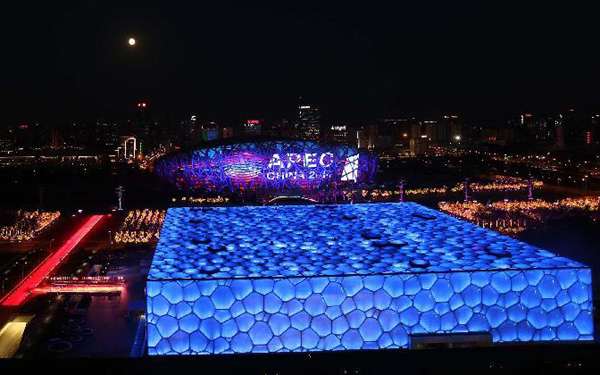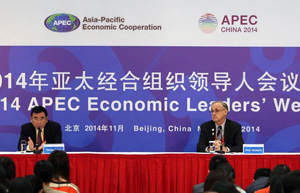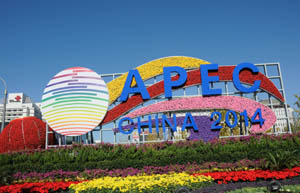 |
|
An APEC logo is shown on the Bird's Nest stadium in Beijing, Nov 6, 2014. The 2014 APEC Economic Leaders' Week is held in Beijing from Nov 5 to 11. [Photo/Xinhua] |
Meetings over the weekend to promote growth
Four key proposals, including the creation of a Free Trade Area of the Asia-Pacific and a global value chain, will be considered at the 2014 ministerial meetings of the Asia-Pacific Economic Cooperation on Friday and Saturday to further fuel the region's robust growth.
Zhang Shaogang, director-general of the department of international trade and economic affairs under the Ministry of Commerce, said the topics - FTAAP, a multilateral trading system, the global value chain and economic and technology cooperation - were determined after a year of high-level talks involving APEC members in different locations and will be discussed at the upcoming leaders' meeting in Beijing on Monday and Tuesday. They may become part of the action guideline under the APEC framework if leaders from the 21 member economies agree.
"To further broaden regional trade liberalization, China will step up efforts to promote the implementation of a multilateral and bilateral Free Trade Area strategy, as well as increasing the exchange of opinions of the development of the Trans-Pacific Partnership and the Regional Comprehensive Economic Partnership," Zhang said.
Fifty-six bilateral, trilateral and multilateral agreements covering free trade zones have been implemented by economies in the APEC region.
China believes a regional free trade agreement would help to integrate these existing agreements and reduce the risk of overlap and fragmentation.
The FTAAP concept was proposed in 2004 and written into the declaration of the APEC economic leaders' meeting in 2006. China proposed the preparation of a feasibility study earlier this year.
Zhang reiterated China's stance of opposing trade protectionism in all its forms. China will work to encourage all parties to agree on the extension - from 2016 to 2018 - of the commitment reached by APEC leaders previously that no party should raise new trade and investment barriers.
"The APEC developing economies are on fast tracks of industrialization. Their governments have acquired greater room for policy adjustment and bigger regional market space to tackle global economic fluctuations," said Zhang Jianping, director of the international economic cooperation institute of the National Development and Reform Commission.
Since economic improvement of the developing economies over previous years has resulted in the accumulation of significant financial resources, trained labor forces and an industrial foundation, Zhang Jianping said, it is the time for countries such as China, ASEAN members and South Pacific economies to push a series of structural reforms and further participate in a binding multilateral cooperation arrangement.
China currently is hoping to complete negotiations for the China-South Korea and China-Australia free trade areas as soon as possible, push for the upgrading of the China-ASEAN FTA and achieve substantial progress in the China-Japan-South Korea FTA negotiations.
Trade between China and other APEC members last year amounted to $2.5 trillion, or 60 percent of the country's total trade volume, while 69 percent of China's outbound direct investment went to APEC economies. APEC members provided 83 percent of foreign investment.
Liu Chenyang, a researcher at the APEC study center at Tianjin-based Nankai University, said the reality in the APEC region is that developed economies are still the center of technological innovation, while most developing economies are not strong enough in many fields.
"Heightening vigilance against financial risk, working out plans for more cutting-edge technologies, accelerating the pace of the global value chain and improving economic and technological cooperation between developed and developing economies could effectively solve issues of energy, social development, education and the environment within the region," Liu said.
|
 |
 |
| Services sector potential engine of Asia-Pacific growth | FTAAP a common vision, not a new rival |
